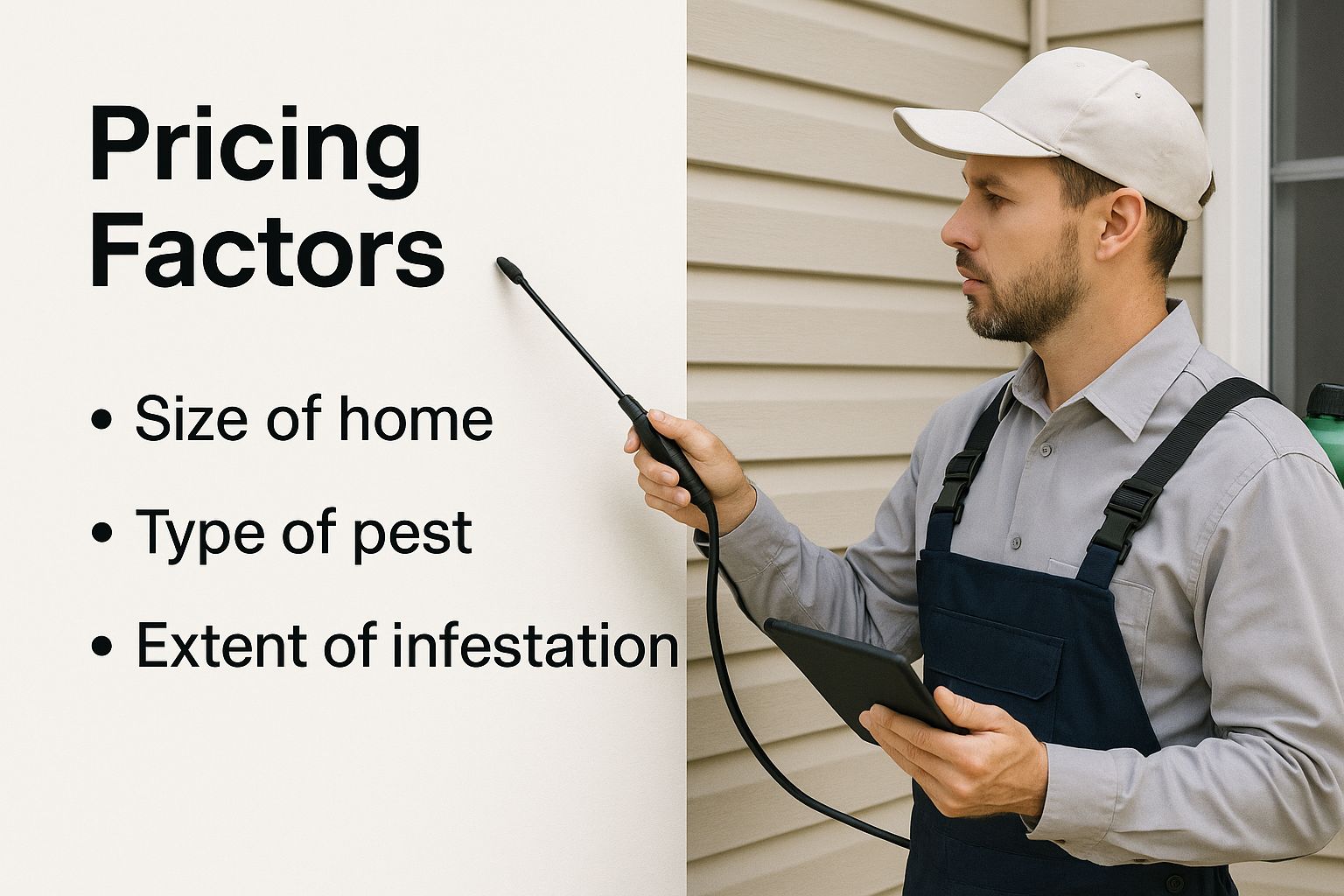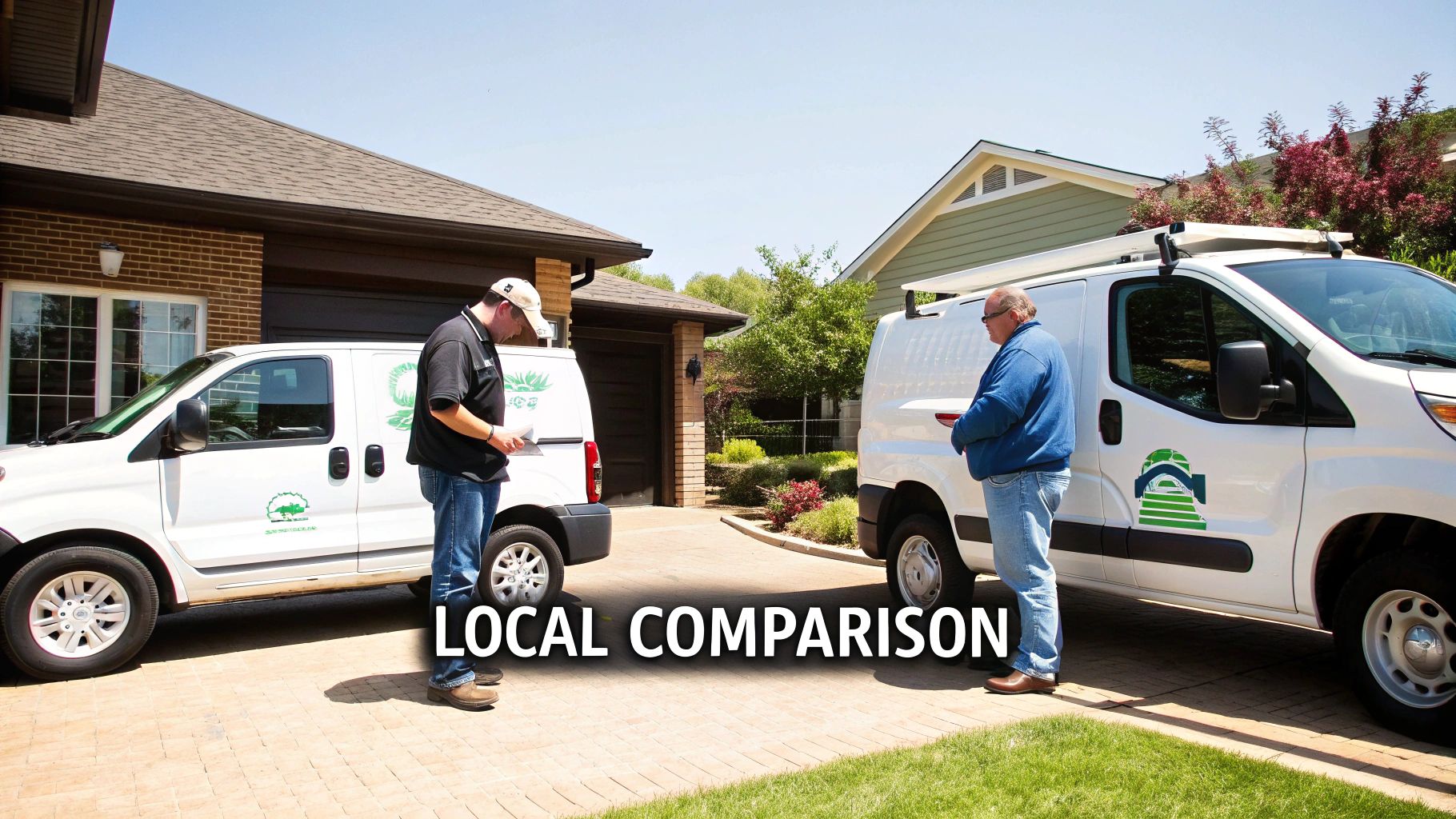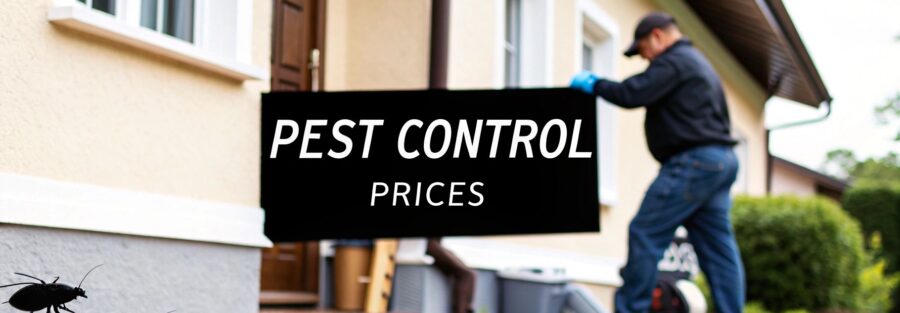When you search for "pest control near me prices", you'll see a pretty wide range. A typical one-off treatment in the UK can cost anywhere from £90 to £350, but that’s really just a ballpark figure. What you actually end up paying is shaped by a few key factors.
Your Guide to UK Pest Control Prices
Trying to pin down what you should expect to pay for professional pest control can be confusing. The price isn't just a random number; it's a careful calculation based on the specific pest you're dealing with, the size of your property, and even where you live.
For instance, a straightforward wasp nest removal is a completely different job—and price—compared to a multi-visit treatment plan for a stubborn rodent problem.
Think of this section as your financial starting point. We’ll break down the average price ranges to give you a solid baseline, helping you budget properly and understand the real value behind the quotes you get.
Estimated Costs for Common UK Pests
To give you a clearer picture, let's look at some typical price ranges you might see. Just remember, these are estimates for standard residential homes and can change depending on the specifics of your situation.
Here’s a quick summary of what you can generally expect to pay for professional pest control in the UK.
Estimated UK Pest Control Prices for Common Pests
| Pest Type | Average Cost for a Single Visit | Average Cost for a Multi-Visit Plan |
|---|---|---|
| Rodents (Rats/Mice) | £120 – £250 | £250 – £500+ |
| Wasps (Single Nest) | £90 – £150 | N/A |
| Bed Bugs | Not typically a single visit | £350 – £700+ |
| Cockroaches | Not typically a single visit | £250 – £600+ |
| Ants | £100 – £180 | £200 – £400 |
As you can see, different pests demand completely different approaches. A single wasp nest can often be sorted in one go. But pests like bed bugs and rodents? They require a more persistent, strategic plan to make sure they’re gone for good, and the pricing reflects that.
You can explore a full breakdown of different pest control services to see exactly what each type of treatment involves.
Geographic and Property Size Impact
The price you pay is also heavily influenced by your postcode and the size of your home. It’s simple, really.
A technician working in central London, for example, has higher running costs—think congestion charges and parking fees—than one based in a quiet rural town. Those overheads naturally get factored into the final price.
In the same way, treating a small one-bedroom flat for mice is a much quicker job than securing a large, four-bedroom house with lots of potential entry points. The amount of product needed, the time it takes for a thorough inspection, and the labour involved all scale up with the property's size. That’s why giving a detailed description of your home is so important when you ask for a quote.
What Really Determines Your Quote?
Ever wondered why one pest control quote is double the price of another? It’s not random. The final figure you see is the result of a careful assessment of several key variables, each one influencing the resources, time, and expertise needed to solve your problem for good.
Think of it like a car repair. A simple oil change has a standard price, but fixing a mysterious engine rattle requires a deep diagnosis, more labour, and specialised parts, which all add up to a much higher bill. The same logic applies when you search for "pest control near me prices".
The infographic below highlights the main factors a technician will consider when building your quote.

As you can see, your final price is a blend of the pest type, infestation level, property size, treatment method, and the number of visits needed. Let's break down exactly how these elements shape your cost.
The Type of Pest
The single biggest factor is the pest itself. Different pests require completely different strategies, safety protocols, and products, which directly impact the price. It's not a one-size-fits-all job.
- Simple Removal: A wasp nest is usually a straightforward, one-visit job with a predictable cost.
- Complex Treatment: Bed bugs, on the other hand, are notoriously difficult to eradicate. They require intensive, multi-stage treatments, specialised equipment like heat systems, and extensive follow-up, making them one of the most expensive pests to remove.
Severity of the Infestation
The extent of the problem is the next critical piece of the puzzle. Is it a small, localised issue, or has a widespread, established colony taken hold?
A technician spotting a few ants on a kitchen counter will quote very differently than for a home where ants have established multiple nests inside the wall cavities. The first is a simple treatment; the second requires a much more invasive and comprehensive plan.
A minor issue caught early is always cheaper to resolve. A severe infestation means more labour, more product, and often, more visits to ensure complete eradication.
Property Size and Layout
It makes sense that the size and complexity of your property influence the time and resources needed for a thorough job. Treating a small, two-bedroom flat is far less time-consuming than inspecting and treating a large, multi-story house with outbuildings.
Technicians have to account for:
- Total Area: More space simply takes more time to inspect and treat properly.
- Complexity: A home with a cellar, loft, and complex layout has far more potential hiding spots for pests.
- Access: Difficult-to-reach areas might require special equipment or additional time to tackle safely.
Understanding how service providers manage their internal expenses can also shed light on pricing. Many businesses use various strategies to reduce overhead costs, but logistical factors like time and fuel for larger areas always get factored into the final quote. This is why an on-site survey is often necessary for an accurate price, and why the number of visits—a single treatment for silverfish versus a three-visit rodent programme—plays such a huge role.
Choosing Between One-Off Treatments and Service Contracts

When you're searching for "pest control near me prices," one of the first questions you’ll face is whether you need a single, decisive strike or an ongoing defence plan. The choice between a one-off treatment and a service contract really boils down to the pest you're dealing with, your property type, and frankly, your tolerance for future surprises.
Think of it this way: a one-off treatment is like calling a plumber to fix a single, gushing leak. It’s a targeted solution for an immediate, isolated problem. A service contract, on the other hand, is like having that same plumber on retainer to regularly check your pipes, preventing future bursts before they happen—especially if you live in an old house known for plumbing issues.
Each approach has its place, and figuring out which is right for you is key to getting the best value for your money.
The One-Off Treatment Approach
A one-off or "job-work" treatment is designed to solve one specific, contained pest problem. It's the perfect choice for those sudden, unwelcome infestations that are unlikely to come back once they've been dealt with properly.
You'd typically go for a one-off treatment for things like:
- A single wasp nest you've discovered in the loft or garden shed.
- A sudden flea infestation after a pet accidentally brought them in.
- An isolated ant nest that has found its way into your kitchen.
The main benefit here is the clear, upfront cost. You pay for the job to be done, and that’s it. The catch, of course, is that it offers no guarantees against a completely new problem cropping up later.
The Service Contract Advantage
An ongoing service contract provides continuous monitoring and protection. It’s a proactive strategy, ideal for properties with a higher risk of recurring pest problems. This is especially vital for businesses that have to meet strict health and safety standards.
Service contracts shift the focus from reactive panic to proactive prevention. They're an investment in long-term peace of mind, making sure small issues are caught before they can explode into costly, large-scale infestations.
This approach is much better suited for situations like:
- Homes in areas known for seasonal rodent problems, where new populations are always looking to move in.
- Properties with persistent cockroach issues, which almost always need ongoing management to keep them at bay.
- Commercial premises, especially in the food and hospitality industries, where a pest-free environment is absolutely non-negotiable. You can learn more about the unique demands of commercial pest control services and why they're so different from residential jobs.
The UK pest control market is surprisingly large, valued at around USD 1.25 billion, and it's growing. This is mainly driven by increasing urbanisation and a greater awareness of public health. It just goes to show how many people are realising the value of professional, ongoing pest management for both homes and businesses. If you're interested, you can discover more insights about this growing market on Cognitive Market Research.
One-Off Treatment vs Ongoing Contract: A Comparison
So, which path is right for you? This table breaks down the key differences to help you decide.
| Feature | One-Off Treatment | Ongoing Contract |
|---|---|---|
| Best For | Sudden, isolated pest issues (e.g., a single wasp nest, fleas). | Recurring or high-risk problems (e.g., rodents, cockroaches). |
| Cost Structure | A single, upfront payment for one job. | Regular, predictable payments (monthly, quarterly). |
| Goal | Reactive: Eliminate a current, specific infestation. | Proactive: Prevent future infestations and provide ongoing monitoring. |
| Guarantees | Typically covers the treated pest for a limited time. | Offers year-round protection and free call-outs for covered pests. |
| Long-Term Value | Cost-effective for a one-time problem. | Better value for properties with persistent or seasonal threats. |
| Ideal User | Homeowners with an unexpected, low-risk pest sighting. | Businesses, landlords, and homes in high-risk areas. |
Ultimately, the right choice comes down to your specific situation. For a one-time invader, a single treatment is efficient and makes perfect sense. But if you're up against a persistent threat or can't afford any pest-related risks, a service contract provides far better long-term value and security.
The Cost of Modern Eco-Friendly Pest Control
When you start looking up "pest control near me prices," it's easy to wonder if a 'green' or eco-friendly option is going to hit your wallet harder. There's a common belief that sustainable methods always come with a premium, but the truth is a bit more complicated—it’s about long-term value, not just the initial bill.
Eco-friendly pest control isn't simply about swapping one chemical for another. It’s a total shift in strategy, best summed up as Integrated Pest Management (IPM). Think of it this way: traditional pest control is like a firefighter who only ever puts out fires. IPM, on the other hand, is like a fire safety inspector who also puts out the fire—it solves the immediate problem while finding and fixing the dodgy wiring that caused it in the first place.
What Is Integrated Pest Management?
IPM is a smarter, more holistic way of thinking that puts prevention first. Instead of just reactively spraying chemicals, an IPM professional digs into the root cause of your pest problem. Their focus is on denying pests the food, water, and shelter they need to thrive.
This preventative approach is really taking hold. The UK insect pest control market, valued at over £800 million, is seeing a huge shift away from purely chemical-based treatments. This change is being driven by environmental awareness and a growing demand for data-led, chemical-free methods like IPM.
Comparing Costs and Long-Term Value
While some advanced eco-friendly methods might look pricier at the outset, they often work out to be far more economical down the line.
- Heat Treatments: A go-to for pests like bed bugs, this can cost more upfront than a chemical spray. But it's incredibly effective in a single go and completely non-toxic, meaning you avoid the expense and disruption of repeat visits.
- Biological Controls: This involves using natural predators to keep pest populations in check. It's a highly specialised but sustainable solution, particularly for certain environments.
- Structural Proofing: Sealing up entry points is a cornerstone of IPM. It might mean an initial investment in repairs, but it provides a permanent barrier that stops future infestations, saving you a fortune in emergency call-outs later.
The real value of an eco-friendly approach is that it solves the core problem. By focusing on prevention and targeted treatments, you rely less on repeated chemical applications. That protects your property, your health, and your wallet in the long run.
Ultimately, investing in a sustainable strategy gives you more than just a pest-free home; it gives you peace of mind. When you choose a provider that specialises in eco-friendly pest control, you’re paying for a lasting solution, not a temporary fix. And that’s usually the most cost-effective decision you can make.
Right, let's get you prepared. Getting a clear, honest quote for pest control shouldn't feel like pulling teeth. To avoid nasty surprises and properly compare "pest control near me prices," you need a solid plan. A little bit of prep before you even pick up the phone is the secret to getting a fair and accurate price.
Think of it like gathering evidence. The more detail you can give a pest controller, the more precise their quote will be. A vague description like "I've got some bugs" will only get you a vague, and frankly, useless estimate.
Having the right details ready means a pro can get a real sense of the job without an initial visit, saving everyone a bit of time.
What to Have Ready Before You Call
Before you start dialling, spend a few minutes pulling together the essential details. This little bit of homework will help you paint a clear picture of the problem, which leads to a much more reliable initial quote.
Jot this stuff down:
- Pest ID: Be as specific as you can. "Small brown bugs in the kitchen" is a start, but "cockroaches under the sink" is far more helpful. If you're not sure, a clear photo is worth a thousand words.
- Location & Scale: Where, exactly, have you seen them? Make a note of all the hotspots, from the loft down to the cellar. Is it just a few ants on the worktop, or is there a constant trail marching across the floor?
- Property Details: Know the rough size of your home and mention what type of property it is – a flat, a terraced house, or a detached home. This context is crucial for estimating the time and amount of product needed.
Critical Questions to Ask Every Single Company
Once you've got your info lined up, it's time to vet the companies you're calling. A reputable professional will have no problem answering your questions; in fact, they should welcome them. How transparent they are is a huge clue to the quality of their service.
Make sure you fire off these questions to every potential provider:
- Are you fully insured? Always ask for proof of public liability insurance. This is what protects you if something gets accidentally damaged during the treatment.
- Do you offer a guarantee? What happens if the pests make a comeback? Get the full story on the terms, how long it lasts, and what the guarantee actually covers.
- What treatment methods will you be using? Ask them to walk you through their plan. You want to know what products they'll use and any safety steps you or your family need to take.
- Is the quoted price all-inclusive? This is a big one. Confirm if the price includes VAT and covers any follow-up visits that might be needed.
Vague pricing, high-pressure sales talk, or dodging your questions are massive red flags. A trustworthy company will give you a clear, itemised quote and explain every part of the service without rushing you. Go with a provider who values transparency as much as you do.
Common Questions About Pest Control Prices

When you start searching for "pest control near me prices," you're bound to have a few questions pop up. It's completely normal. To help you feel more confident, we've put together some quick, straight-to-the-point answers to the questions we hear most often from homeowners and businesses.
This section gets right to it, tackling those common concerns so you can make a smart, informed decision without any of the guesswork.
Do I Always Need a Survey Before Getting a Price?
Not always, but for a truly accurate quote, it’s usually the best way to go. If you've got a simple, clear-cut issue like a single wasp nest you can see, a pro can often give you a solid price right over the phone. Easy.
But for anything more complex or mysterious, a survey is non-negotiable. Pests like bed bugs, cockroaches, or an unknown rodent issue need an expert eye to figure out what’s really going on.
A survey lets a technician:
- Correctly identify the pest if you're not sure what you're dealing with.
- Figure out how bad the infestation is and where it has spread.
- Find the hidden entry points that need to be sealed up.
- Build a proper treatment plan that will actually solve the problem.
Think of it this way: you wouldn't want a doctor to diagnose you based on a quick phone call. You'd want them to actually examine you. An on-site inspection provides the crucial details needed for an accurate diagnosis and an effective plan, saving you from surprise costs down the line.
Why Is Pest Control in London More Expensive?
If you’ve noticed that quotes in London and other big cities seem a bit steep, you’re not imagining things. The price difference isn’t really about the treatment itself—it’s about the much higher cost of just doing business in a dense urban centre.
A technician working in central London faces daily logistical hurdles that simply don't exist in smaller towns. These include congestion charges, extremely limited and expensive parking, and higher wage expectations for skilled professionals.
On top of that, the sheer population density means there's a much greater demand for pest control, which naturally influences pricing. So while the products and methods are the same, the business overheads are just in a different league.
Does Home Insurance Cover Pest Control?
This is a big one, and the short answer is almost always no. Most standard home insurance policies in the UK view a pest infestation as a maintenance issue—something that could have been prevented with regular upkeep.
Insurers see it as the homeowner's job to keep their property in a condition that doesn't invite pests in. There are, however, very rare exceptions. For example, if rodents chew through wires and start a fire, your policy might cover the fire damage, but it still won't pay for getting rid of the rodents themselves. Your best bet is to always read your policy documents carefully to see what is and isn't covered.
Are DIY Pest Control Methods a Cheaper Option?
Grabbing a can of bug spray from the shop might seem like a bargain, but it’s often a false economy. Those DIY products are much weaker than professional-grade treatments and just aren't up to the job of tackling an established infestation.
Worse still, using shop-bought solutions can sometimes scatter pests like cockroaches into different parts of your home, making the problem much harder to fix later on. A professional has the training, equipment, and knowledge to get to the root of the problem safely and effectively. In the long run, hiring an expert is almost always the more cost-effective choice because they get it right the first time.
For a professional, evidence-based approach that solves your pest problems at the source, trust the experts at Pest Predators Limited. Our qualified Field Biologist leads a team dedicated to providing effective, eco-friendly, and lasting solutions. Secure your peace of mind and get a transparent quote today.



